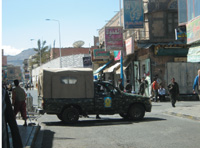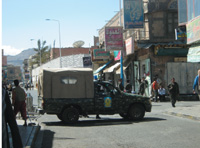
Protestors burn Egyptian flag during consulate attack [Archives:2009/1221/Front Page]
January 1 2009
 |
and Salma Ismail
SANA'A, Dec. 31 ) The Egyptian ambassador in Sana'a, Mohammed Mursi, confirmed that a group of twenty protestors broke into the Egyptian consulate in Aden and many other protestors gathered in front of the Egyptian embassy in Sana'a last Tuesday. The demonstrators protested the Egyptian attitude towards the Gaza attacks and demanded that Egypt open up the Rafah passage for the Palestinians.
Protestors climbed on the roof, setting the Egyptian flag on fire and replacing it with a Palestinian flag. No casualties among the Egyptian staff were reported.
The spokesman of the Egyptian Ministry of Foreign Affairs, Husam Zaki, condemned the attempt to break into the Egyptian consulate in Aden and blamed Yemeni security forces, whom he accused of not exerting enough effort to protect the consulate.
He added that Yemeni security should have paid more attention to the necessity of providing protection for an important diplomatic headquarters like the Egyptian consulate in Aden.
Currently there are extensive security forces surrounding the Egyptian embassy in Sana'a and consulate in Aden, in an attempt to prevent any future attacks.
Zaki indicated that the consulate, which is composed of three employees, had some of its furniture damaged, hoping that Yemeni security forces will take over security procedures that ensure the security and safety of the Egyptian diplomatic commissions in the future.
“There was aggression and transgression against the consulate in Aden and there were also many demonstrators around the embassy in Sana'a. When we called security, they came and arrested many of them,” Mursi said.
Mursi described the protestors as making a tendentious try to exploit current world political situations in order to damage relations between Yemen and Egypt.
“We have been supporting the Palestinian issue and we never accept anyone questioning the Egyptian's attitude,” Mursi added.
An official security source in the Ministry of Interior stated that hundreds of students from Sana'a University headed towards the Egyptian consulate in Aden, which is close to the Faculty of Education. The source said that as a result of the huge crowd as well as the pressure, some troublemakers entered the consulate building and started breaking windows, causing material damages to the consulate. The source expressed regret over the incident and strongly condemned such acts of sabotage.
The Yemeni president Abdullah Ali Saleh apologized to the Egyptian president Hosni Mubarak in a phone call last Tuesday for the aggression that the consulate was subject to.
This comes as Sana'a and a number of provincial capitals in the country witnessed mass demonstrations against the Israeli aggression and the massacres committed by the Israeli military machine in the Gaza Strip. Protestors continue to voice anger as they appeal to kings, presidents, and leaders in the Arab world to adopt a strong position against these attacks based on Islamic and humanitarian principles. They also called on influential countries to put pressure on Israel to end the massacre in Gaza, much of which is without power as food supplies run dangerously low.
Varying Arab political attitudes
The essential divide is between, on the one hand, states aligned with the West – chief among them Egypt and Saudi Arabia – and on the other, Hezbollah, an alliance backed by Iran and led by Hassan Nasrallah. Israel's action in Gaza has led to unprecedented tensions between representatives of these rival blocs.
Egypt, which has been blockading Gaza from its southern end at the Rafah crossing – the only way for Arab assistance to reach people in Gaza – has come under pressure from the rest of the Arab world to reopen its border with the territory because of the Israeli offensive. Egypt briefly opened the border to let in some of Gaza's wounded and to allow some humanitarian supplies to enter the territory, but it quickly sealed the border when Gazans tried to push through forcefully.
President Hosni Mubarak of Egypt responded to critics, including the leader of the Lebanese militia Hezbollah, who have accused him of collaborating with Israel.
“We tell anybody who seeks political profit on the account of the Palestinian people: The Palestinian blood is not cheap,” he said, describing such comments as “exploiting the blood of the Palestinians.”
Mubarak said his country would not throw open the Rafah crossing unless Palestinian President Mahmoud Abbas regains control of the border post.
In a televised address, Hezbollah leader Nasrallah, who led a devastating war with Israel in 2006, called for an open revolt against Egypt as part of the fight against Israel. This is the first time that any such call against an Arab government has been made.
The Egyptian government was quick to respond to Nasrallah's apparent call for Egyptian citizens to rise up against it. Foreign Minister Aboul Gheit said that the Egyptian armed forces existed to defend Egypt. He added, addressing Nasrallah directly, that “if need be, they will also protect Egypt from people like you.”
As the violence continues, so do diplomatic efforts to stop it, and foreign pressure has grown on both sides to end hostilities. Diplomats said that the deadliest conflict in the Gaza Strip in four decades appeared close to a tipping point.
France had proposed a 48-hour truce that would allow in more humanitarian aid for Gaza's 1.5 million residents, as Turkish Prime Minister Tayyip Erdogan flew to Syria on Wednesday as part of a four-country diplomatic push in the region to end hostilities
Israel said the time was “not right” for a ceasefire in the Gaza Strip and stepped up preparations for a possible ground offensive. Officials said that Israeli Cabinet ministers have approved the mobilization of 2,500 army reservists, expanding on an earlier call-up of 6,500 soldiers for the garrison on the Gaza border.
After five consecutive days of aerial assault, Israel has rejected calls for an immediate temporary ceasefire to allow humanitarian aid into the Gaza Strip. Nearly 400 Palestinians, at least a quarter of whom were civilians according to United Nations figures, have been killed. Additionally, at least 2000 Palestinians have been injured as Israeli warplanes and helicopter gunships have dropped hundreds of bombs and missiles on the densely inhabited strip.
On the other side, four Israeli citizens have been killed in rocket and mortar attacks from the Gaza Strip since Israel began its offensive.
——
[archive-e:1221-v:16-y:2009-d:2009-01-01-p:front]


